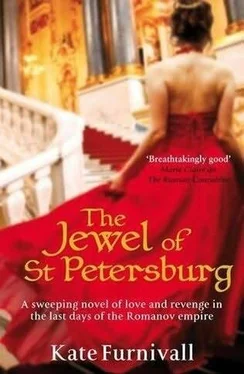“Don’t be so impatient. This will be your home for a long time to come.” His eyes grew dark and he dropped his hand to his leg. “Like this knee will be my reminder of you for a long time to come.”
“If I’d had my way, it would have been your brains spattered over that courtyard, not your knee.”
Arkin’s hand jerked, and for a moment Jens thought the man’s control would slip. Underneath the mask of his face, under that hard arrogance, rage prowled. Jens could see its shadow.
“So what is it,” Jens demanded, “that you came to tell me?”
“I want you to know that I slept with your wife at the izba in the marshes.”
“You’re lying.”
“It’s the truth.”
“You are a filthy fucking liar. Valentina loathes you. She wouldn’t let you lay a finger on her without clawing your eyes out.”
“It was her idea. She loved it.”
Jens went for him. Caught him by surprise and slammed his fist into the gloating mouth. The guards used their metal bars, but Jens had the satisfaction of seeing blood on Arkin’s face and a twist of fury as he wiped it away with his wrist.
“I know her, Friis, I know every inch of her body. The freckle on her thigh, I kissed it, the tiny white scar on her ribs, I sucked it till she moaned, the thick black curls around the moist center of her, I licked them as I put my fingers inside her and…”
If three guards had not thrown their chains around Jens he would have killed Arkin.
“Get out!”
With a satisfied smile, Viktor Arkin limped out of the cell.

VALENTINA SEARCHED FOR JENS DAY AND NIGHT FOR EIGHT months. But people had vanished all over the city, friends and loved ones there one day and gone the next, so no one wanted to know, no one cared. They were all too frightened for themselves. Mobs roamed the streets, opened prisons, slaughtered police. They set fire to large houses at whim and torched a courthouse and the offices of the secret police. The Okhrana agents were hanged from lampposts in their turn. The city was ablaze with red banners and posters: DESTROY THE TYRANTS and VICTORY BELONGS TO THE PEOPLE OF RUSSIA.
Valentina took care. Such care that people stopped recognizing her. She wore plain peasant’s clothes, handwoven dresses and shawls, a scarf around her head, and heavy cobbled boots on her feet. She grew thin, so that her cheeks became hollow, as pale and gaunt as the workers on the street. She let her shoulders droop and her spine sag and kept her eyes lowered, her gaze fixed to the ground so that no one would see the rage that burned within it. She would kiss Lydia and leave her with her toy train and her books shut in her room at home, but never did she find anyone who had heard a whisper about a Danish engineer called Jens Friis.
Tsar Nicholas had been forced to abdicate. He and his family were put under house arrest in Tsarskoe Selo and later taken by train to Siberia. Petrograd changed then. Valentina saw it happen. It turned red. Red armbands, red ribbons, red cockades in caps. Alexander Kerensky headed the new Provisional Government, but he panicked as the city continued to spiral out of control. General Kornilov, the commander in chief of the army, was sacked, and the war against Germany stumbled through defeat after defeat until the people of Russia were begging on their knees for it to end.
It was a summer of chaos.

THE GREATEST CHAOS WAS IN VALENTINA’S HEART. IT FORGOT how to beat. It forgot how to be something living, and instead lay silent and empty, the blood drained from it, a black brittle shell that felt as heavy as lead behind her ribs. Sometimes she tapped her chest with the tips of her fingers or even thumped a fist between her breasts, but nothing she did could set it going again. Was that what was meant by a broken heart? Like a broken watch.
The odd thing was that her eyes had remembered what her heart had forgotten. At night in bed without Jens they wept, as if her tears could release her pain in a way her heart could not. Her body ached for her husband, for the strength of him inside her. Her nostrils inhaled again and again his scent on the pillow. She wore his shirt in bed, his socks in her boots, his tiepin in the collar of her blouse. If she could have used the instruments on his desk she would have, but instead she carried his watch in her pocket.
She didn’t see Liev Popkov again after the day she had bandaged his head. But she wasn’t sorry. Although she told him she didn’t blame him for her husband’s capture and he told her he didn’t blame her for the loss of his eye, they were both lying. So she searched for Jens where she could. She went to Varenka’s old house again, but she wasn’t there and the friendly man with the gypsy wife claimed he had never heard of Viktor Arkin. However much she paid him. She went to the basement room that stank of sewer water where Jens had taken her, but no one there had heard of Viktor Arkin, either.
She went to the church. The priest wasn’t there, not the one who had lied to her. She was told he’d been whipped to death by tsarist troops in his village in front of his daughter. Not even that image made her heart murmur inside her. In her plain peasant clothes she went to meetings, pinned a red ribbon to her chest, and attended every political meeting in every church and every hall she could find. She smiled at eyes she hated, talked with men who wanted to shoot all government ministers, walked with factory women to bars, and even played the piano in one. Always she wore gloves to hide her smooth hands.
Nobody knew of Viktor Arkin. What had he done? Gone back to Moscow? With Jens?
Where are you, Jens?
Talking to him in her mind was the closest she came to feeling a flicker in her heart. That, and when she sat on his white reindeer rug with her daughter on her lap and read to her about Isambard Kingdom Brunel.

SOMETIMES ARKIN WATCHED THEM, ELIZAVETA AND VALENTINA.
When he was sick of meetings. Tired of the shouting and the arguments as each man tried to impose his will on the swirling rush of ideas, throwing up new plans, new schemes, new rules. Kerensky had turned on the Bolsheviks, smashed the printing presses of their newspaper Pravda and the offices of their Central Committee. He had ordered the arrest of Zinoviev and Kamenev for campaigning against the war and even of Lenin himself, who had been forced to flee into hiding again.
But the time was close now. This chaos could not continue. With a Red Guard numbering twenty-five thousand fighters in Petrograd and with the support of the Baltic sailors, they had already defeated the assault by General Lavr Kornilov. Arkin burned in his soul for the Bolsheviks to take over the country in one almighty bloody coup, to put an end to this pretense of government under Kerensky. And in a secret back room away from other ears, he had voiced to Lenin the need to stamp out the other revolutionary parties. No Mensheviks. No Socialist Revolutionaries. No Kadets. Only one could rule, and that one was the Bolsheviks. Russia needed an iron fist.
That was why Arkin had returned to Petrograd. To be at Vladimir Lenin’s side and to make certain the opposition revolutionary leaders would end up rotting in the Peter and Paul Fortress. But sometimes when he was tired and his knee ached worse than usual, he let himself watch them in the street, Elizaveta and Valentina. Valentina was clever. She was a chameleon, hiding in her drab browns, merging with her background, thinking no one would see her. Did she really imagine that any man who looked at her face wouldn’t remember it? She had grown more beautiful in the years he’d been away in Moscow, more sensual, even more desirable in the way she moved, just a turn of her head or a flick of her hair.
Читать дальше















